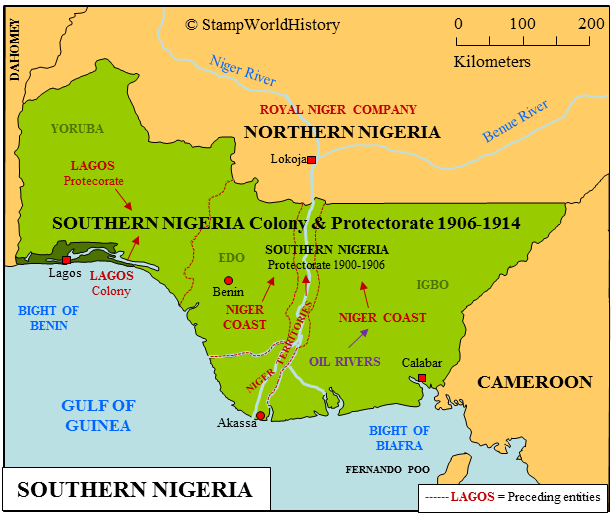- The name Nigeria is the colonial name given to the country and was coined by the wife of Frederick Lugard, the architect of colonial Nigeria.
- Nigeria is the most populous nation in Africa with more than 190 million people made up of 250 ethnic groups.
- In 1886, the Royal Niger Company was given the royal charter to control trade in the region.
- The British colonialist Lugard believed that the traditional leaders among the Fulani known as Emirs should handle daily running of the protectorate.
- In Southern Nigeria where the Yoruba lived; an educated exclusive group sought to take leadership rather than accept traditional leadership in the governance of their affairs.
- In Southeastern Nigeria where the Igbo lived; their culture had no traditional chiefs and the British attempt to infringe on the autonomy of the Igbo proved disastrous for the colonialists.
- The purpose of the British colony Nigeria was to export resources to Britain to be used in the industrial mills of Britain to make the British more competitive than other European nations.
- Nigeria’s colonial government began collecting taxes in order to make the colony self-sustaining which was in contrast to the traditional rule of the chiefs.
- The educated Christians who had learnt how to read and write became educated and then challenged authority of colonialism.
- Diversity in thought on how to govern and the desire for self-determination led to the creation of the Federal system after independence. The east was made of mostly Igbo, the Yoruba dominated the West and the Northern states were mostly made up of Hausa-Fulani.

10 Things You Should Know About Nigeria’s Colonial Past
Most Read
Author Details

Bebisha Wagle
Members of Kanta Dab Dab, a band specialising in fusion of local Nepali and Western music elements, talk about their…
Advertisement


